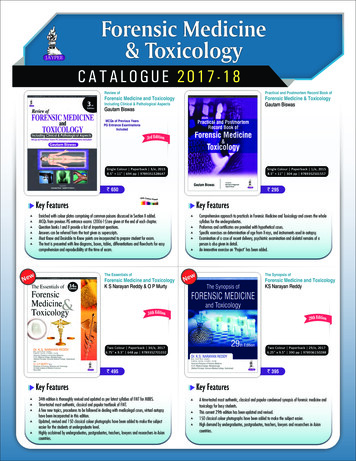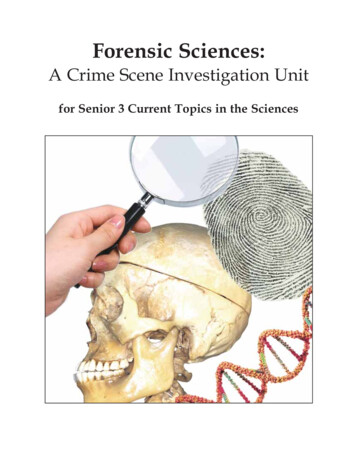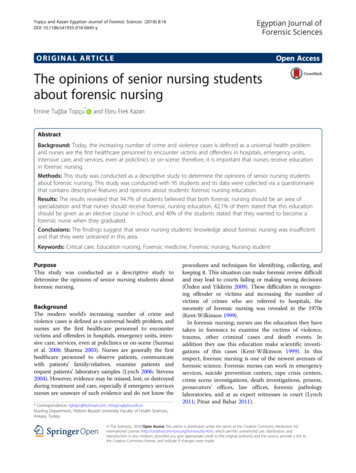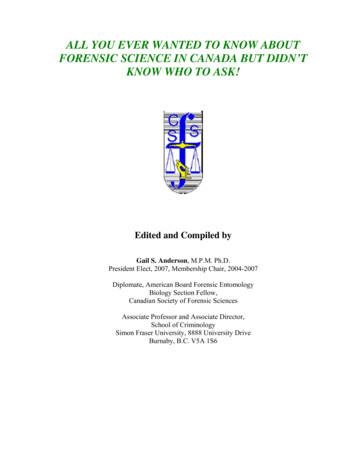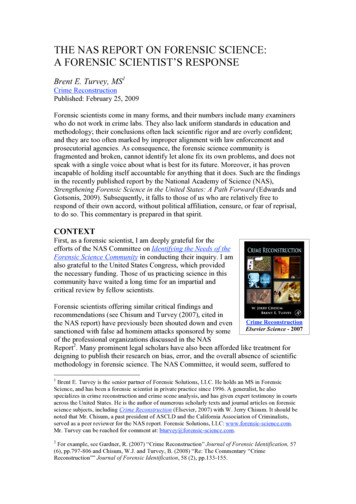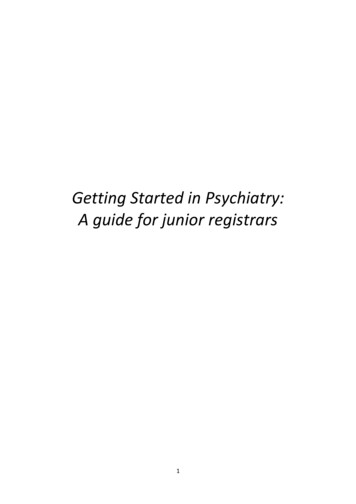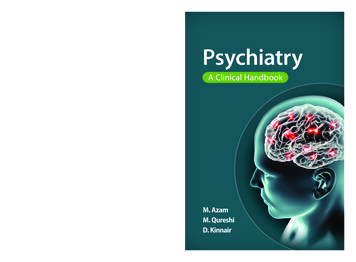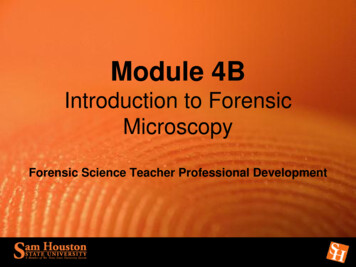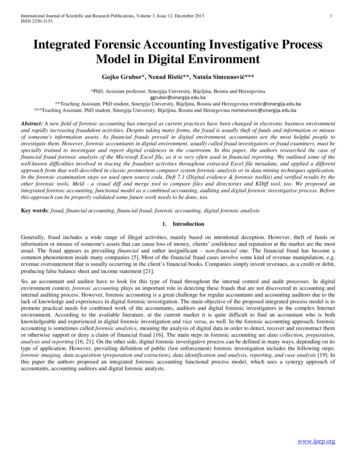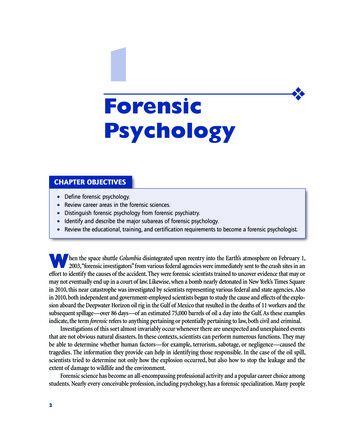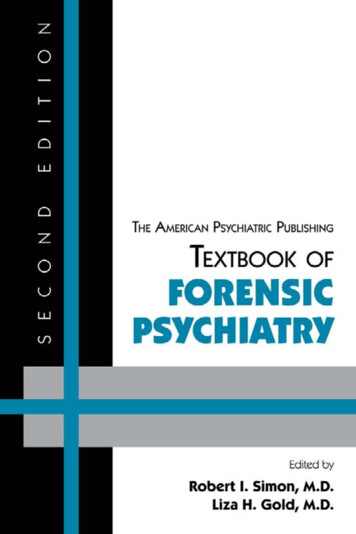
Transcription
THE AMERICAN PSYCHIATRIC PUBLISHINGTEXTBOOK OFFORENSICPSYCHIATRYSECOND EDITION
This page intentionally left blank
THE AMERICAN PSYCHIATRIC PUBLISHINGTEXTBOOK OFFORENSICPSYCHIATRYSECOND EDITIONEdited byRobert I. Simon, M.D.Liza H. Gold, M.D.Washington, DCLondon, England
Note: The authors have worked to ensure that all information in this bookis accurate at the time of publication and consistent with general psychiatricand medical standards, and that information concerning drug dosages,schedules, and routes of administration is accurate at the time of publicationand consistent with standards set by the U.S. Food and Drug Administrationand the general medical community. As medical research and practice continue to advance, however, therapeutic standards may change. Moreover,specific situations may require a specific therapeutic response not includedin this book. For these reasons and because human and mechanical errorssometimes occur, we recommend that readers follow the advice of physicians directly involved in their care or the care of a member of their family.Books published by American Psychiatric Publishing, Inc., represent the viewsand opinions of the individual authors and do not necessarily represent thepolicies and opinions of APPI or the American Psychiatric Association.If you would like to buy between 25 and 99 copies of this or any other APPI title,you are eligible for a 20% discount; please contact APPI Customer Service at appi@psych.org or 800-368-5777. If you wish to buy 100 or more copies of thesame title, please e-mail us at bulksales@psych.org for a price quote.Copyright 2010 American Psychiatric Publishing, Inc.ALL RIGHTS RESERVEDManufactured in the United States of America on acid-free paper14 13 12 11 105 4 3 2 1First EditionTypeset in Adobe’s Berkeley and KabelAmerican Psychiatric Publishing, Inc.1000 Wilson BoulevardArlington, VA 22209-3901www.appi.orgLibrary of Congress Cataloging-in-Publication DataThe American Psychiatric Publishing textbook of forensic psychiatry / editedby Robert I. Simon, Liza H. Gold. — 2nd ed.p. ; cm.Other title: Textbook of forensic psychiatryIncludes bibliographical references and index.ISBN 978-1-58562-378-5 (hardcover : alk. paper)1. Forensic psychiatry. I. Simon, Robert I. II. Gold, Liza H., 1958–III. Title: Textbook of forensic psychiatry.[DNLM: 1. Forensic Psychiatry. W 740 A5127 2010]RA1151.A47 2010614′.15—dc222010004299British Library Cataloguing in Publication DataA CIP record is available from the British Library.
Our knowledge is the amassed thought andexperience of innumerable minds.Ralph Waldo Emerson (1803–1882)This text is dedicated to our professional colleagues,whose commitment to ethical practice and excellencecontinues to advance the field of forensic psychiatry.
This page intentionally left blank
ContentsContributors . . . . . . . . . . . . . . . . . . . . . . . . . . . . . . . . xiForeword . . . . . . . . . . . . . . . . . . . . . . . . . . . . . . . . . xvPaul S. Appelbaum, M.D.Preface. . . . . . . . . . . . . . . . . . . . . . . . . . . . . . . . . . . xixRobert I. Simon, M.D.Liza H. Gold, M.D.Acknowledgments . . . . . . . . . . . . . . . . . . . . . . . . . xxiiiPART IINTRODUCTION TOFORENSIC PSYCHIATRY1Rediscovering Forensic Psychiatry. . . . . . . . . . . 3Liza H. Gold, M.D.2Introduction to the Legal System . . . . . . . . . . 43Daniel W. Shuman, J.D.
3Starting a Forensic Practice . . . . . . . . . . . . . . 63Liza H. Gold, M.D.Steven H. Berger, M.D.4The Expert Witness. . . . . . . . . . . . . . . . . . . . . 93Thomas G. Gutheil, M.D.5Ethics in Forensic Psychiatry . . . . . . . . . . . . . 111James L. Knoll IV, M.D.6Psychiatric Diagnosis in Litigation . . . . . . . . . 151Robert I. Simon, M.D.Liza H. Gold, M.D.7The Forensic Psychiatric Examinationand Report . . . . . . . . . . . . . . . . . . . . . . . . . 175Robert M. Wettstein, M.D.PART IICIVIL LITIGATION8Professional Liability in Psychiatric Practiceand Requisite Standard of Care . . . . . . . . . . 207Donald J. Meyer, M.D.Robert I. Simon, M.D.Daniel W. Shuman, J.D.9Competencies in Civil Law . . . . . . . . . . . . . . 227Alan A. Abrams, M.D., J.D.
10Personal Injury Litigation andForensic Psychiatric Assessment. . . . . . . . . . 261J. Richard Ciccone, M.D.Joshua C.W. Jones, M.D.11Disability . . . . . . . . . . . . . . . . . . . . . . . . . . . 283Albert M. Drukteinis, M.D., J.D.12The Workplace. . . . . . . . . . . . . . . . . . . . . . . 303Liza H. Gold, M.D.PART IIIISSUES13INCRIMINAL JUSTICECompetency to Stand Trial andthe Insanity Defense. . . . . . . . . . . . . . . . . . . 337Charles L. Scott, M.D.14Forensic Assessment of Sex Offenders . . . . 373John Bradford, M.D., FRCPCBrad Booth, M.D., FRCPCMichael C. Seto, Ph.D.15Correctional Psychiatry . . . . . . . . . . . . . . . . 395Jeffrey L. Metzner, M.D.Joel A. Dvoskin, Ph.D., ABPP16Forensic Psychiatryand Law Enforcement . . . . . . . . . . . . . . . . . 413Debra A. Pinals, M.D.Marilyn Price, M.D.
PART IVSPECIAL TOPICS17Malingering . . . . . . . . . . . . . . . . . . . . . . . . . 453H. W. LeBourgeois III, M.D.John W. Thompson Jr., M.D.F. William Black, Ph.D.18Children and Adolescents . . . . . . . . . . . . . . 483Peter Ash, M.D.19Forensic Geriatric Psychiatry . . . . . . . . . . . . 505Stephen L. Read, M.D.Robert Weinstock, M.D.20 Personal Violence . . . . . . . . . . . . . . . . . . . . 529Alan R. Felthous, M.D.21Understanding RiskAssessment Instruments. . . . . . . . . . . . . . . . 563Douglas Mossman, M.D.22 Forensic Psychiatry and the Internet. . . . . . 587Patricia R. Recupero, J.D., M.D.23 Psychological Testing inForensic Psychiatry. . . . . . . . . . . . . . . . . . . . 617Madelon V. Baranoski, Ph.D.Appendix:Glossary of Legal Terms . . . . . . . . . . . . . . . . . . . . . 659Subject Index . . . . . . . . . . . . . . . . . . . . . . . . . . . . 671Legal Case Index . . . . . . . . . . . . . . . . . . . . . . . . . . 699
ContributorsAlan A. Abrams, M.D., J.D.Professor of Clinical Psychiatry, Georgetown University Hospital, Washington, D.C.Paul S. Appelbaum, M.D.Elizabeth K. Dollard Professor of Psychiatry, Medicine and Law; Director,Division of Law, Ethics and Psychiatry, Department of Psychiatry, ColumbiaUniversity/ New York State Psychiatric Institute, New York, New YorkPeter Ash, M.D.Director, Psychiatry and Law Service; Chief, Child and Adolescent Psychiatry; and Associate Professor, Department of Psychiatry and Behavioral Sciences, Emory University, Atlanta, GeorgiaMadelon V. Baranoski, Ph.D.Associate Professor, Law and Psychiatry, Department of Psychiatry, Yale University School of Medicine, New Haven, ConnecticutSteven H. Berger, M.D.Volunteer Clinical Assistant Professor of Psychiatry, Indiana UniversitySchool of Medicine, Lafayette, Indianapolis, IndianaF. William Black, Ph.D.Emeritus Professor of Psychiatry and Neurology, Department of Psychiatryand Neurology, Tulane University School of Medicine, New Orleans, LouisianaBrad Booth, M.D., FRCPCForensic Psychiatrist, St. Lawrence Valley Correctional & Treatment Centre—Secure Treatment Unit, Royal Ottawa Mental Health Centre; Assistant Professor,Department of Psychiatry, Division of Forensic Psychiatry, University of Ottawa;Education Director, Integrated Forensic Program, Ottawa, Ontario, CanadaJohn Bradford, M.D., FRCPCProfessor and Head, Division of Forensic Psychiatry, University of Ottawa;Professor of Psychiatry, Queen’s University; Professor, School of Criminology, University of Ottawa; Associate Chief (Forensic), Royal Ottawa Healthcare Group, Brockville Mental Health Centre, Brockville, Ontario, Canadaxi
xiiTEXTBOOK OF FORENSIC PSYCHIATRY, SECOND EDITIONJ. Richard Ciccone, M.D.Professor of Psychiatry and Director, Psychiatry and Law Program, University of Rochester Medical Center, Rochester, New YorkAlbert M. Drukteinis, M.D., J.D.Adjunct Associate Professor of Psychiatry, Dartmouth Medical School;Director, New England Psychodiagnostics, Manchester, New HampshireJoel A. Dvoskin, Ph.D., ABPPClinical Assistant Professor, Department of Psychiatry, University of ArizonaCollege of Medicine, Tucson, ArizonaAlan R. Felthous, M.D.Professor and Director, Forensic Psychiatry Division, Department of Neurologyand Psychiatry, Saint Louis University School of Medicine, St. Louis, MissouriLiza H. Gold, M.D.Clinical Professor of Psychiatry and Associate Director, Program in Psychiatry and Law, Department of Psychiatry, Georgetown University School ofMedicine, Washington, D.C.Thomas G. Gutheil, M.D.Professor of Psychiatry, Department of Psychiatry, Beth Israel-DeaconessMedical Center, Harvard Medical School, Boston, MassachusettsJoshua C.W. Jones, M.D.Clinical Assistant Professor of Psychiatry and Director of Education, Psychiatryand Law Program, University of Rochester Medical Center, Rochester, New YorkJames L. Knoll IV, M.D.Associate Professor of Psychiatry and Director of Forensic Psychiatry, SUNYUpstate Medical University, Syracuse, New York; Director, Forensic Psychiatry Fellowship, Central New York Psychiatric Center, Marcy, New YorkH. W. LeBourgeois III, M.D.Assistant Professor of Psychiatry; Director, Forensic Psychiatry Fellowship,Department of Psychiatry and Neurology, Tulane University School of Medicine, New Orleans, LouisianaJeffrey L. Metzner, M.D.Clinical Professor of Psychiatry, University of Colorado School of Medicine,Denver, ColoradoDonald J. Meyer, M.D.Associate Director of Forensic Psychiatry, Beth Israel Deaconess Medical Center; Assistant Clinical Professor of Psychiatry, Harvard Medical School, Boston,Massachusetts
ContributorsxiiiDouglas Mossman, M.D.Director, Glenn M. Weaver Institute of Law and Psychiatry, University ofCincinnati College of Law; Adjunct Professor of Clinical Psychiatry, University of Cincinnati College of Medicine, Cincinnati, OhioDebra A. Pinals, M.D.Director, Forensic Education and Associate Professor of Psychiatry, Law andPsychiatry Program, Department of Psychiatry, University of MassachusettsMedical School, Worcester, MassachusettsMarilyn Price, M.D.Clinical Instructor in Psychiatry, Harvard Medical School; Law and Psychiatry Service, Massachusetts General Hospital, Boston, MassachusettsStephen L. Read, M.D.Clinical Professor Psychiatry, Department of Psychiatry and BiobehavioralSciences, David Geffen School of Medicine, University of California, Los Angeles; and Psychiatrist, Greater Los Angeles Veterans Affairs Health CareSystem, Los Angeles, CaliforniaPatricia R. Recupero, J.D., M.D.Clinical Professor of Psychiatry, Warren Alpert Medical School of BrownUniversity; President and CEO, Butler Hospital, Providence, Rhode IslandCharles L. Scott, M.D.Chief, Division of Psychiatry and the Law; Clinical Professor of Psychiatry;and Director, Forensic Psychiatry Fellowship, University of California DavisMedical Center, Sacramento, CaliforniaMichael C. Seto, Ph.D.Consultant, Royal Ottawa Health Care Group, Brockville Mental HealthCentre, Brockville, Ontario, CanadaDaniel W. Shuman, J.D.M.D. Anderson Foundation Endowed Professor of Health Law, DedmanSchool of Law, Southern Methodist University, Dallas, TexasRobert I. Simon, M.D.Clinical Professor of Psychiatry and Director, Program in Psychiatry andLaw, Department of Psychiatry, Georgetown University School of Medicine,Washington, D.C; Chairman, Department of Psychiatry, Suburban Hospital,Johns Hopkins Medicine, Bethesda, MarylandJohn W. Thompson Jr., M.D.Professor of Psychiatry; Vice Chairman and Chief, Adult Psychiatry; Director, Division of Forensic Neuropsychiatry, Department of Psychiatry andNeurology, Tulane University School of Medicine, New Orleans, Louisiana
xivTEXTBOOK OF FORENSIC PSYCHIATRY, SECOND EDITIONRobert Weinstock, M.D.Clinical Professor Psychiatry, Department of Psychiatry and BiobehavioralSciences, David Geffen School of Medicine, University of California, Los Angeles; and Psychiatrist, Greater Los Angeles Veterans Affairs Health CareSystem, Los Angeles, CaliforniaRobert M. Wettstein, M.D.Clinical Professor of Psychiatry, University of Pittsburgh School of Medicine,Pittsburgh, PennsylvaniaThe following contributor to this book has indicated a financial interest in orother affiliation with a commercial supporter, a manufacturer of a commercialproduct, a provider of a commercial service, a nongovernmental organization,and/or a government agency, as listed below:Brad Booth, M.D., FRCPC—Consultant and speaker and recipient of unrestricted educational grants: AstraZeneca, Eli Lilly, Janssen-Ortho.The following contributors have no conflicting interests to report:Peter Ash, M.D.Madelon V. Baranoski, Ph.D.Steven H. Berger, M.D.F. William Black, Ph.D.John Bradford, M.D., FRCPCJ. Richard Ciccone, M.D.Albert M. Drukteinis, M.D., J.D.Joel A. Dvoskin, Ph.D., ABPPAlan R. Felthous, M.D.Liza H. Gold, M.D.Thomas G. Gutheil, M.D.Joshua C.W. Jones, M.D.James L. Knoll IV, M.D.H.W. LeBourgeois III, M.D.Jeffrey L. Metzner, M.D.Donald J. Meyer, M.D.Douglas Mossman, M.D.Debra A. Pinals, M.D.Marilyn Price, M.D.Stephen L. Read, M.D.Patricia R. Recupero, J.D., M.D.Charles L. Scott, M.D.Michael C. Seto, Ph.D.Daniel W. Shuman, J.D.Robert I. Simon, M.D.Robert M. Wettstein, M.D.
ForewordNot long ago, a casual acquaintance who knows that I am a forensic psychiatrist asked me with a tone of puzzlement, “How much interactionis there between psychiatry and the law anyway?” Rarely do I get the opportunity to talk about my field in social settings, so—perhaps imprudently— Iseized the moment.“To start with,” I said, “there are the ways in which the criminal justice system relies on psychiatric input, including assessments of defendants’ competence to stand trial, criminal responsibility, and competence to waive theirrights—along with presentence evaluations, and the less common assessments such as determination of prisoner’s competence to be executed. Moreover, psychiatric testimony plays a critical role in the civil justice system aswell, ranging from evaluations of plaintiff’s emotional harms to assessments ofdecisional and performative competences, and including evaluations of disability, harassment claims, and malpractice issues. Forensic psychiatrists playan increasing role in correctional facilities, providing evaluations and treatment, and in hospitals settings, where they perform assessments of violencerisk and committability, and consult on legal issues in psychiatric and generalmedical care.”At this point, before I could launch into a description of the more esoteric forensic roles that over the years I had been called on to fulfill, my interlocutor took advantage of a pause for breath to throw up his hands andsay, “OK, I get it. I never knew there was that much to forensic psychiatry.”I suspect that he is not alone. Even other psychiatrists often are unawareof how rich and varied the world of contemporary forensic psychiatry reallyis. Indeed, the field has seen continued evolution and impressive expansionin recent years. For example, with greater societal concern about sex offenders has come the development of a nascent subspecialty in their evaluationand treatment. Greater receptivity on the part of the courts to claims of emotional harm has multiplied opportunities for injured parties to recover for theinjuries they may have suffered, and offers an expanded focus of endeavor to forensic experts. What was once a specialty limited (at least in the United States)xv
xviTEXTBOOK OF FORENSIC PSYCHIATRY, SECOND EDITIONalmost entirely to evaluative functions has embraced the role of providing treatment in jails and prisons, spurred by the continued growth in the numbersof persons with mental illnesses behind bars.At the same time, forensic psychiatry has seen a dramatic expansion in itsempirical base. Opinions that were once grounded solely in personal—andtoo often idiosyncratic—impressions now can draw on previously unavailable sources of data. Judgments about the likelihood that a person is competent to make a decision about treatment or the probability that a defendantwill commit a violent act can be informed by studies applying new structuredapproaches to these assessments, using rigorous methods. The same is truefor evaluations of various forms of disability, psychiatric symptoms consequent to tortious acts, malingering, paraphilias such as sexual attraction tochildren, and even parenting capacity. Although the courts have sometimes beenwary about accepting these innovative approaches—a caution clearly warrantedwhen misguided expert witnesses attempt to posit scientific answers to moralquestions—there seems no doubt that forensic psychiatry is moving steadily toward becoming an evidence-based specialty.That trend may well be accelerated by the ongoing advances in our understanding of the brain, its functioning, and its pathologies. In recent years,we have begun to see the introduction into evidence of results from functionalmagnetic resonance imaging (fMRI), positron emission tomography (PET),and other techniques for visualizing brain function. These techniques havebeen employed in efforts to negate criminal responsibility, to demonstrate thepresence of pain, and to determine whether consciousness is present in patients with profound neurologic impairments—but their ultimate value and appropriate uses still remain to be determined. Neuroscience-based lie detectiontechnologies have been proposed and are being tested, and behavioral geneticshas made its appearance on the witness stand as well. Not only will the forensic psychiatrist of the future need to develop excellent clinical skills, broadfamiliarity with legal principles, and knowledge of forensic assessment techniques, but he or she will also need to keep up with the latest advances inneuroscience and their utility in the courtroom.Beyond advances in assessment techniques and the introduction of cutting-edge science, another energizing force in the field has been the growthand maturation of fellowship programs in forensic psychiatry. Whereas forensic practitioners once taught themselves how to perform evaluations andlearned about relevant legal rules through hard and sometimes painful experience, a newer generation of psychiatrists is being trained in accredited subspecialty fellowships, often of excellent quality. The leaders of the field incoming years will have legal, clinical, and empirical backgrounds of unprecedented scope. Special training programs targeting the unique and underserved area of child and adolescent forensic psychiatry have been developed,
Forewordxviiand the first research fellowships have begun to appear in the field as well.The advent of board certification and periodic recertification in forensic psychiatry should help practitioners to maintain their skills and knowledgebase at a high level.Thus, the time is propitious for the appearance of this second edition ofThe American Psychiatric Publishing Textbook of Forensic Psychiatry. The editors,Drs. Robert I. Simon and Liza H. Gold, themselves experienced and respectedforensic psychiatrists, have recruited many of the leaders of our field—a substantial number newly added to this edition—to produce a wide-ranging andcomprehensive overview of forensic psychiatry. With a decidedly practicalemphasis, the contributors help forensic psychiatrists establish their practices,perform state-of-the-art evaluations, and use the latest assessment tools. Coverage includes rapidly developing subareas of the field, including child andgeriatric forensic psychiatry, consultation to law enforcement, and use of theInternet. At the same time, the editors have not neglected the basics of ourforensic work: conducting evaluations, writing reports, testifying, and practicing within accepted ethical norms.This is an exciting time to pursue a career in forensic psychiatry, and thisvolume is a splendid accompaniment on that journey.Paul S. Appelbaum, M.D.Elizabeth K. Dollard Professor of Psychiatry, Medicine and LawDirector, Division of Law, Ethics and Psychiatry, Department of Psychiatry,Columbia University/ New York State Psychiatric InstituteNew York, New York
This page intentionally left blank
PrefaceWe are pleased to present the second edition of The American Psychiatric Publishing Textbook of Forensic Psychiatry. As we noted in the prefaceto the first edition, the preacher in Ecclesiastes said, “of making books there isno end.” This is no less true today than it was 5 years (or 2000 years) ago. Whythen publish a second edition of this text just 5 years after the first?Despite forensic psychiatry’s status as an acknowledged subspecialty, general clinicians still perform the bulk of forensic assessment. When we published the first edition, no textbook of forensic psychiatry had been written forgeneral clinicians. In organizing the first edition of this textbook for a general clinical audience, we returned full circle to the early years of the medicalsubspecialty of psychiatry, when forensic practice and general clinical practice were not differentiated. Isaac Ray, the first “forensic psychiatrist,” in his1838 landmark book A Treatise on the Medical Jurisprudence of Insanity, drewno distinction between the general psychiatrist and the forensic psychiatrist.However, forensic psychiatry is still an evolving subspecialty. The past 5 yearshave seen changes and developments in the law and in forensic practice. General clinicians, as well as those who identify themselves primarily as forensicspecialists, should be aware of these developments. Forensic experts who contributed chapters to the first edition have reviewed and incorporated thesechanges and discuss their practical implications in this second edition. Newauthors have contributed chapters on some essential forensic subjects coveredin the first edition, providing new perspectives that also incorporate recentdevelopments in the field.The first edition also provided the opportunity to identify gaps in knowledge, both in subjects covered and in subjects omitted. Much to our delight,the enthusiastic reaction to our first edition included suggestions regardingsubjects that deserved discussion in a general textbook of forensic psychiatry. We believe we have taken advantage of this opportunity in the second edition. Thus, in addition to updating the subjects covered in the first edition, thesecond edition has been expanded to include chapters, as suggested by our audience, on the subjects of forensic geriatric psychiatry and forensic psychixix
xxTEXTBOOK OF FORENSIC PSYCHIATRY, SECOND EDITIONatry and the Internet. These chapters provide invaluable guidance in thesecutting-edge areas of forensic practice.Many areas of psychiatry require specialized knowledge. Clinicians receive training in subspecialty areas such as child and adolescent psychiatry,addiction psychiatry, and geriatric psychiatry through required and electivecourses and clinical rotations in the course of their residency training. Incontrast, exposure to formal didactic training in forensic psychiatry is stilllimited, and formal clinical training almost nonexistent, unless young psychiatrists pursue fellowships. Clinicians, unfamiliar with basic forensicpractice, often fear to become involved in forensic cases and avoid forensicpractice entirely. Alternatively, when their participation in forensic mattersbecomes unavoidable, they suffer undue anxiety and often recognize too latethat they do not have the skills needed to provide competent services.This book is not intended to turn the general clinician into a forensicspecialist. As in any other subspecialty of medicine or psychiatry, generalpractitioners are encouraged to have some training and knowledge in the subspecialty and to practice within their expertise. They are also encouraged torecognize the limits of their expertise and to refer complicated cases to specialists. We hope to provide the basic information that general clinicians need todischarge forensic obligations, whether required or voluntarily, in a competent manner. We hope, too, to help them recognize the areas of practice thatrequire advanced forensic skills and training, and encourage them to referthese cases to forensic subspecialists or obtain consultation. We also hopethis volume contains much of interest to forensic specialists, who can alwayslearn from the knowledge and experience of their colleagues. These chaptersprovide general clinicians and forensic specialists alike with concise reviewsand accepted practices that will expand their level of expertise in this excitingand challenging subspecialty.We take great pride in presenting this second edition of a collection of contributions from outstanding authorities in forensic psychiatry. As has oftenbeen observed, the intersection of the fields of psychiatry and the law createsa complicated and foreign terrain. Understanding the lay of this land is essential in order to negotiate it effectively. Although Isaac Ray did not differentiate between the general clinician and forensic specialist, Ray recognized thatclinicians who entered the legal arena needed specialized skills to acquit themselves competently and urged his colleagues to acquire them. As Ray wrotein 1851:It cannot be too strongly impressed upon our minds that the duty of an expert is very different from those which ordinarily occupy our attention, andrequires a kind of knowledge, and a style of reflection, not indispensable totheir tolerably creditable performance. [Clinical and diagnostic skills] will
Prefacexxirender [the clinician] but indifferent service on the witness stand. There, hewill feel the need of other resources than these, and fortunate will he be, ifhe do not learn his deficiency before he has exposed it. (Ray I: “Hints to theMedical Witness in Questions of Insanity.” American Journal of Insanity 1851,Vol. 8, p. 55)We hope that the combined knowledge and experience regarding forensic assessments and practice presented in this book will help guide both general clinicians and forensic specialists to a positive, rewarding experience inthe field of forensic practice.Robert I. Simon, M.D.Liza H. Gold, M.D.
This page intentionally left blank
AcknowledgmentsOur thanks to American Psychiatric Publishing, Inc., for the opportunity topresent this expanded second edition. Many thanks also to Ms. Tina ColtriMarshall for her invaluable assistance in the day-to-day production of thisbook. We express our special appreciation to Patricia A. Simon and Ian J. Nyden, Ph.D., for their love and consistent encouragement. Finally, we gratefullyacknowledge our chapter authors for their outstanding contributions. It hasbeen gratifying to collaborate again with those who have updated their original contributions and with those who have contributed new chapters.xxiii
This page intentionally left blank
PARTIINTRODUCTIONTO FORENSICPSYCHIATRY
This page intentionally left blank
Chapter1RediscoveringForensicPsychiatryLiza H. Gold, M.D.Plus ça change, plus c’est la meme chose.[The more things change, the more theyremain the same.]Alphonse Karr (1849)Forensic psychiatryhas become an acknowledged and respected psychiatric subspecialty in recent decades. Psychiatrists have become increasingly aware of the need for expertise in legal aspects ofpsychiatric practice and in satisfying the legal system’s need for psychiatricparticipation in adjudicating matters involving mental health. Training in forensic psychiatry is a core competency in psychiatric residencies. Socialforces, including the influence of managed care on the practice of psychiatry,have played a role in stimulating interest in this subspecialty practice (Binder2002; Rappeport 1999). Nevertheless, the intellectual challenges inherent inworking at the interface of psychiatry and the law have drawn some of themost capable psychiatric practitioners to apply their skills in legal arenas.3
4TEXTBOOK OF FORENSIC PSYCHIATRY, SECOND EDITIONOrganizational and professional developments have reflected increasing interest in the practice of forensic psychiatry. The American Board of ForensicPsychiatry (ABFN), now disbanded, began certifying the accreditation of forensically trained psychiatrists in 1979. The American Board of Medical Specialties and the American Psychiatric Association officially recognized forensicpsychiatry as a subspecialty in 1992 (Prentice 1995; Rappeport 1999). TheAmerican Board of Psychiatry and Neurology formally recognized forensic psychiatry as a subspecialty and took over the ABFN’s certification process, issuingits first certification for Added Qualifications in Forensic Psychiatry in 1994.The number of practitioners who identify themselves as forensic psychiatrists mirrors these institutional developments. The American Academy ofPsychiatry and the Law (www.aapl.org), the professional organization of forensic psychiatrists, was founded in 1969 with only 10 members. In 2008,the American Academy of Psychiatry and the Law claimed almost 2,000 members. In the 1960s and 1970s, a limited number of fellowship programs wereavailable, but interest in such training was almost nonexistent (Rappeport1999). Currently, 50 forensic fellowships offer specialized training in theUnited States and Canada, and most of these programs are filled.Nevertheless, despite appearing to be a new subspecialty, forensic psychiatry has been practiced for years, and psychiatrists establishing forensic practicesare in fact only rediscovering their professional roots. Forensic and clinical psychiatry developed in tandem, and both were considered integral facets of thenew profession. The field of psychiatry, arguably the first subspecialty of medicine1 (Grob 1994), developed in the first decades of the nineteenth century. Forensic psychiatric practice played an important but underrecognized role in thedevelopment of psychiatry by connecting this new specialty with the field ofmedical jurisprudence. In d
xiv TEXTBOOK OF FORENSIC PSYCHIATRY, SECOND EDITION Robert Weinstock, M.D. Clinical Professor Psychiatry, Department of Psychiatry and Biobehavioral Sciences, David Geffen School of Medicine, Un iversity of Californ ia, Los An-geles; and Psychiatrist, Greater Los Angeles Vet
